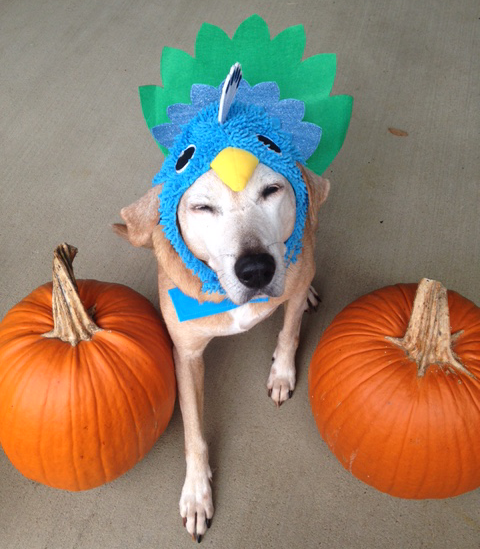The leaves are falling, the weather is getting cooler, and store shelves are stocked with candy as far as the eye can see. Halloween can be an enjoyable time of year for dressing up our four-legged friends in just about any costume you can imagine, but this fall holiday also poses a very real danger for animals.
Chocolate poisoning occurs when an animal has ingested enough chocolate to reach a toxic level within the body. This toxic level varies from pet to pet and is typically based on weight, breed, type of chocolate consumed, and other factors. Among other symptoms, chocolate toxicity causes diarrhea, vomiting, shaking, rapid heart rate, and can lead to seizures and death. Aside from chocolate, other candy can cause similar issues. Xylitol, which is most commonly found in chewing gum, is toxic to animals.

Ducati is sporting her very special peacock costume just in time for Halloween!
During this upcoming holiday season, please be mindful of where you store your Halloween candy. Animals have a keen sense of smell and become very resourceful. If your pet ingests chocolate or candy, do not wait to seek medical attention. Please contact our office, your local emergency center, or animal poison control at 855-764-7661 to provide life-saving medical care.
Now that the weather is changing, it is also important to remember that our pets feel the cold just as we do. Here are a few additional cold weather tips to help care for your furry friends as we move into the fall season here in Wisconsin:
- Ensure outdoor kennels and exercise areas are protected from the wind and cold. Now is the time to properly insulate those areas before the snow begins to fall. Keep any water bowls left outside free of ice that may form overnight.
- Monitor your pet for signs of stiffness or pain in the joints. Many animals suffer from arthritis in the cooler temperatures that can be eased with the use of medications or supplements. Please call for an appointment so that our doctors can better assist you with these helpful products.
- Do not leave animals unattended in cold weather situations. Hypothermia can set in quickly as the temperature drops, especially during periods of rain or snow.
- Watch carefully for forming ice as animals have a tendency to slip and injure themselves.
We are happy to answer any questions that you may have. Please feel free to call the office at 262-534-9392. Have a safe and colorful fall!
